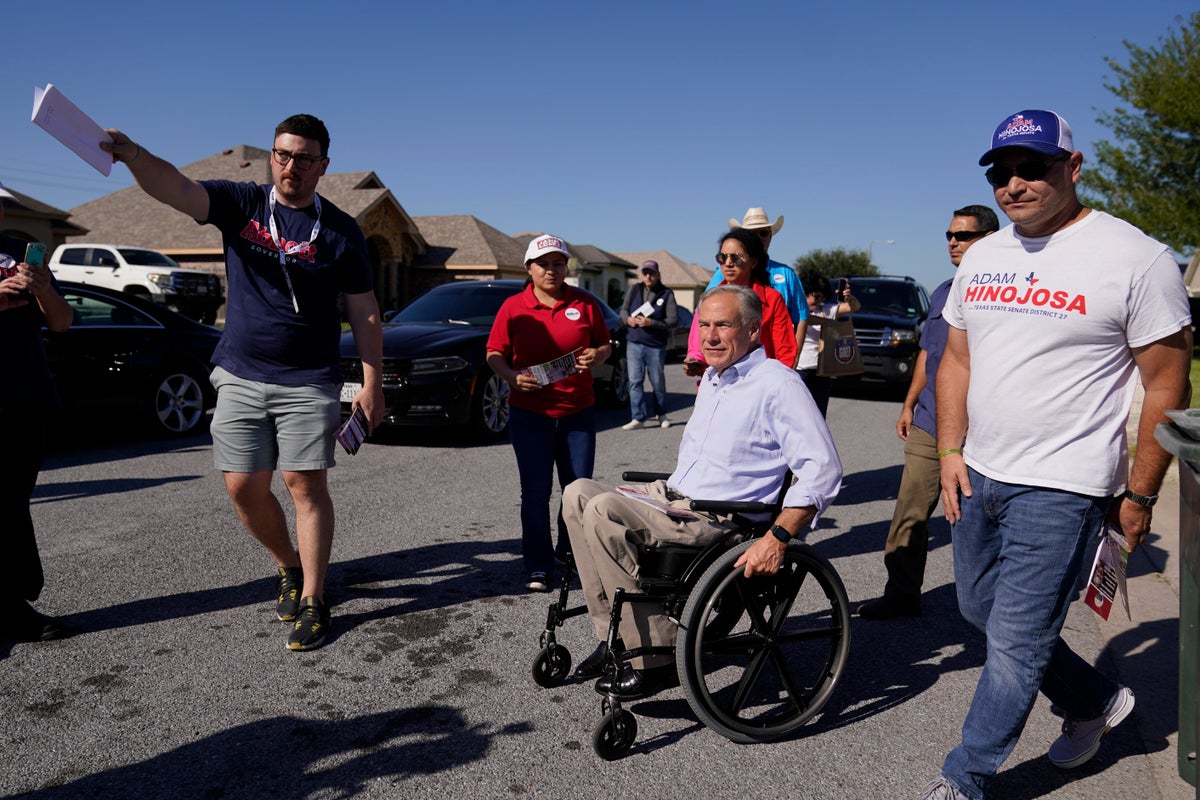
Just weeks before Election Day in Texas, once again there is big money, new signs of shifting voters and bold predictions of an upset that will turn heads across the U.S.
But this time, it's coming from Republicans.
“We are going to turn the Rio Grande Valley red,” said Republican Gov. Greg Abbott, kicking off a rally in the Texas border city of Harlingen.
As Democrats embark on another October blitz in pursuit of flipping America's biggest red state, Republicans are taking a swing of their own: making a play for the mostly Hispanic southern border on Nov. 8 after years of writing off the region that is overwhelmingly controlled by Democrats.
The task — like Democrat Beto O’Rourke ’s underdog campaign to unseat Abbott — is an uphill climb. But it is another way Republicans are putting plenty at stake on the Texas border, given that they are already refocusing the final sprint of the 2022 midterms on portraying the 1,200-mile boundary as rife with escalating danger and disorder as record number of migrants enter from Mexico.
Border Democrats say dramatic moves to bus and fly migrants across the country will backfire with voters, but also acknowledge they can no longer coast into office.
Still, the rare sight of contested races on the Texas border has widened cracks in an important Democratic stronghold two years after former President Donald Trump's significant gains with Hispanic voters during the 2020 election caused both parties to scramble in unexpected ways.
“This is the first time we’ve ever had this many competitive races where the Democrats are like, ‘What are we going to do?’” said Republican Carlos Cascos, a onetime border Democrat who switched parties and later served as Abbott's first secretary of state.
He's doesn't see Republicans sweeping races in the Rio Grande Valley, home to roughly 1.5 million people. But, he says, “I think this area has been taken for granted a lot. In the Valley, you're born two things: a Catholic and a Democrat. Things are changing.”
Democrats still hold advantages in South Texas — decades of incumbency, a culture of residents voting Democratic, and more moderate candidates who are less vulnerable to GOP attacks on the left and more critical of President Joe Biden when his approval ratings remain low and inflation is still high.
But Republican Rep. Maya Flores’ victory in a special election this year, becoming the first Texas Latina in the U.S. House, reflected the shifting ground. Rep. Vicente Gonzalez, a South Texas Democrat, switched districts to more favorable territory and is hoping to unseat her for a full term in November.
Democrats have dismissed dramatic moves by Abbott and Florida Gov. Ron DeSantis, two potential 2024 presidential contenders, to send migrants to places like Washington, New York and Martha’s Vineyard. But Republicans counter that more liberal voters in big cities far from the border are ignoring problems that are hitting largely working-class South Texans.
Running for Texas’ most competitive House seat, which stretches from east of San Antonio to border communities including McAllen, Republican Monica de la Cruz blamed “an elite class that just does not get it because illegal immigration has virtually no impact on their lives.”
“Wall Street bankers don’t have to worry about a poor Central American migrant undercutting their wages,” de la Cruz told reporters recently.
Former South Carolina Gov. Nikki Haley is set to campaign with Flores and de la Cruz on the border Monday — an unusual display of national GOP political force for South Texas.
Those efforts to control the political narrative coincides with the Republican Party opening 38 minority outreach community centers around the country, including in McAllen and another border city, Laredo, as well as in heavily Hispanic Houston and San Antonio.
Some offer services like tutoring for U.S. citizen classes and tax advice. They’ve also hosted movie nights, pot-luck dinners and business roundtables, as well as course on topics like crypto currency. Some have been open for more than a year.
The GOP says it has spent millions on Hispanic outreach nationwide, including 30-plus ad buys in Spanish-language media encompassing digital, TV, radio and print. It also has a record 32 Hispanic Republican nominees on House ballots around the country, although many are underdogs.
Democrats, for their part, opened a national field office in McAllen in April and have three staffers working on the area's congressional race, the party's first such investment in recent memory.
Richard Gonzales, Democratic Party chair of Hidalgo County, which includes McAllen, said party officials hold weekly Zoom calls with O’Rourke’s campaign to coordinate efforts that have focused on boosting turnout, especially among non-active voters. He said gains in 2020 by Trump and the Republicans were real but “very candidate specific” and unlikely to “translate to future races.”
O’Rourke, who in the past ran unsuccessfully for Senate and president, also heads a nonprofit called Powered By People. In 2020, he organized phone banking that saw volunteers contact voters in Webb County — which includes Laredo, where less than 40% of eligible voters cast ballots in the 2018 Senate race — hoping to boost turnout for Biden.
The group registered thousands of Webb County voters, and eventually saw turnout climb to 50% of eligible voters in the 2020 election. But Trump sharply increased his support in Webb County, taking nearly 26,000 votes, about double his 2016 raw vote total — and captured about 38% overall support there, compared with about 23% in 2016.
“People want to say that the Democrats are done down here, that the Republicans are taking over. That is not true,” Gonzales said. “What this has done is it has woken up the Democrats down here and made us realize, ‘Hey, we can’t take this for granted anymore.’”
___
Weissert reported from Washington.







